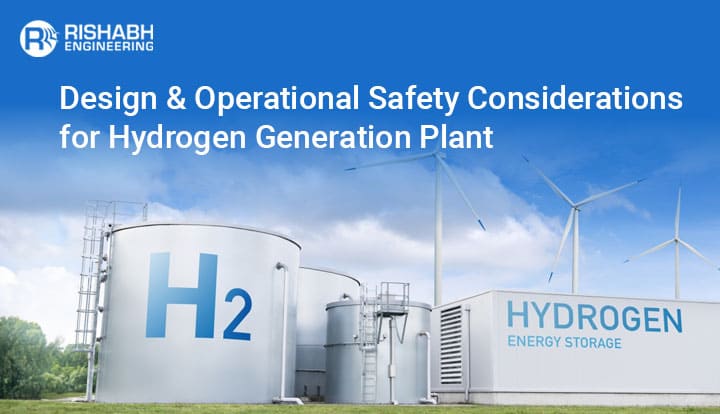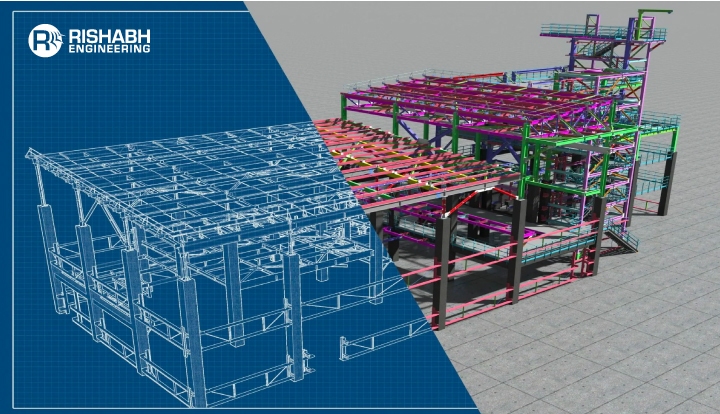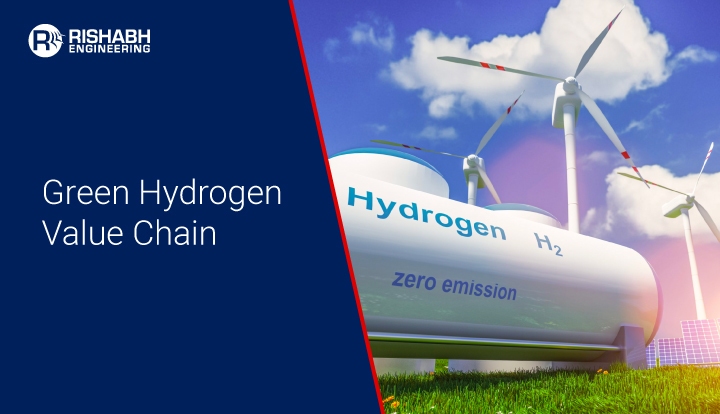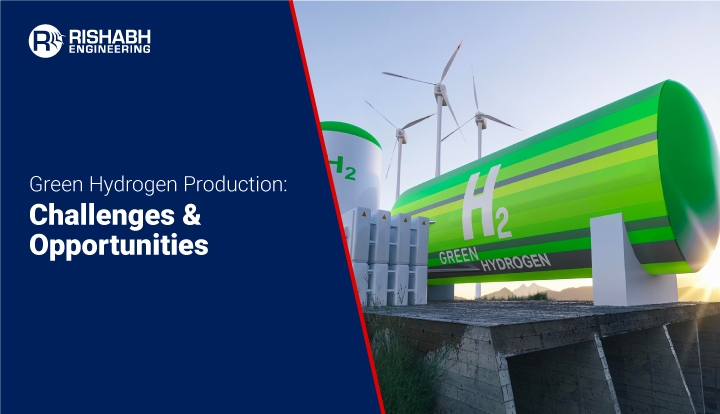
Hydrogen Production Plant Design & Operational Safety Considerations
Hydrogen production facilities play an important role in the shift to sustainable energy, with processes such as steam methane reforming (SMR), electrolysis, and partial hydrocarbon oxidation leading the charge. Each of these methods has distinct issues in terms of safety, design, and operating efficiency. SMR, for example, entails tremendous pressures and temperatures, whereas electrolysis needs precise electrical control. A complete design approach is required to ensure these facilities operate safely and efficiently. Success in this gas production depends on a sound engineering strategy that promotes safety and dependability at all stages, from material selection to emergency response planning. In this post, we’ll go into the critical aspects of hydrogen production plant design, analyze how to maintain operational safety, and describe how Rishabh Engineering can support these efforts.

Key Considerations for Hydrogen Production Plant Design
- Choosing Appropriate Materials: The small molecular size of this gas allows it to enter and weaken specific materials, a phenomenon known as hydrogen embrittlement. To avoid structural issues, it is vital to use materials such as exceptionally strong stainless steel or alloys that can survive gas exposure. Companies like Rishabh Engineering can assist in selecting and evaluating materials suited for hydrogen settings.
- Pressure and Temperature Management: High pressures and temperatures are frequently encountered throughout hydrogen creation, particularly using technologies such as SMR. Designing pressure vessels, piping systems, and temperature control devices is crucial to ensuring safety. Advanced engineering studies, such as finite element analysis (FEA) and computational fluid dynamics (CFD), can assist in optimizing these systems’ safety and performance.
- Ensuring Ventilation and Leak Detection: Due to its low molecular weight and high diffusivity, hydrogen is prone to leaks, which can build in tight places and cause explosive circumstances. Implementing adequate ventilation systems and modern leak detection technology is critical to plant safety. Multidisciplinary engineering firms may integrate these technologies into the entire design of any plant, ensuring the detection of leaks and mitigation.
- Developing Emergency Shutdown Systems: In an emergency, reliable emergency shutdown (ESD) mechanisms must be in place. These systems must be designed to securely turn off hydrogen production, depressurize the system, and promptly isolate impacted sections. Engineering firms may create and deploy ESD systems that fulfill industrial standards and regulatory requirements.
- Conducting Hazard and Operability Studies (HAZOP): The listed studies are crucial to identify dangers & operability concerns. This analysis thoroughly helps investigate the plant architecture to identify hazards and devise mitigation solutions. Businesses like Rishabh Engineering may lead HAZOP investigations while employing their interdisciplinary skills to improve plant safety and dependability.
Green Hydrogen Production Challenges & Solutions
Green hydrogen, produced using renewable energy, highlights the transition towards cleaner energy. However, its large-scale production & transportation could pose a challenge. This gas must be highly compressed or kept in a liquid state, where both methods are extremely resource-intensive. While pipelines offer a potential solution, cost and efficiency improvements are needed. Therefore, the current methods must evolve for large-scale efficiency. Rishabh Engineering team has the relevant experience to support you with designing optimal design packages across all phases of Hydrogen production, from designing efficient transportation to storage systems and more, while ensuring safety & scalability. Explore green hydrogen production challenges and solutions from Rishabh Engineering’s perspective to overcome them.
How Does Rishabh Engineering Support Hydrogen Plant Design?
Rishabh Engineering’s diverse technical knowledge positions it well to support procedures for hydrogen production plant design and operational safety. We provide complete support to help these facilities improve their safety, efficiency, and dependability.
- Complete Engineering Design and Analysis: Rishabh Engineering offers thorough engineering design services like 3D modeling and simulation. Their knowledge of complex software tools such as CAESAR II, ANSYS, and Bentley MicroStation allows them to build facilities that fulfill demanding safety and performance standards. The organization also does FEA and CFD assessments to improve designs for pressure management, thermal performance, and structural integrity.
- Safety and Risk Management Expertise: We conduct HAZOP studies, risk assessments & design safety management systems. Their interdisciplinary approach guarantees that safety is handled from all perspectives, including mechanical, electrical, and process engineering, resulting in a holistic safety plan.
- Material Selection and Testing Services: Our team can support you with selecting the most suitable components for hydrogen service and test and analyze them to guarantee they fulfill safety and performance criteria. This reduces the chance of hydrogen embrittlement and other material problems, improving the plant’s overall safety and durability.
- Operational Support and Workforce Training: We offer operational support services such as maintenance plans, inspection procedures, and customized training programs for plant operators. Their training services guarantee that people are equipped to handle the problems of hydrogen generation, resulting in safer and more efficient operations.
Ensuring Operational Safety In Hydrogen Plant Design
- Implementing Maintenance and Inspection Protocols: Routine maintenance and inspections guarantee that hydrogen-producing plants operate safely and efficiently in the long run. This involves routine inspections of pressure vessels, pipes, valves, and safety systems. A multidisciplinary engineering company may create thorough maintenance plans and inspection processes, including predictive maintenance approaches, to address possible problems before they become serious.
- Providing Training and Building Competency: Running a generation facility requires highly trained personnel familiar with safety measures, operating standards, and emergency response. Multidisciplinary engineering firms may create and deliver bespoke training programs that provide plant staff with the skills and knowledge required to handle the intricacies of hydrogen production properly.
- Managing Process Safety: Process Safety Management (PSM) holds significant importance in operational safety for hydrogen-producing plants. It includes applying systematic safety management techniques such as hazard analysis, operating procedures, mechanical integrity, and emergency preparedness. Companies like Rishabh Engineering can assist you in developing and implementing PSM programs that adhere to industry best practices and regulatory regulations.
- Conducting Risk Assessments and Mitigation Planning: Regular risk assessments are crucial for detecting and mitigating potential safety issues in hydrogen-generating plants. Quantitative risk assessments (QRAs) may examine the likelihood and effects of different failure scenarios. Engineering firms may evaluate these, develop mitigation strategies, and implement safety measures to reduce the plant’s overall risk profile.
- Developing Emergency Response Plans: Despite strong preventative measures, the possibility of an incident cannot be excluded. As a result, developing a well-organized emergency response plan is vital. This approach should include rules for evacuation, confinement, and coordination with emergency services. Multidisciplinary engineering organizations may help create, test, and refine these strategies to ensure their efficacy in crises.
Finally, ensuring the safety and efficiency of hydrogen production facilities demands a comprehensive approach that includes routine maintenance, staff training, and rigorous safety management. Multidisciplinary engineering firms, such as Rishabh Engineering, may assist in developing comprehensive maintenance plans, delivering specialist training, and implementing process safety management systems. This entails conducting key safety studies, such as HAZOP and SIL evaluations and quantitative risk assessments (QRAs), to detect and reduce potential risks. Effective emergency response planning guarantees that you are ready for any disaster.
Final Words
The safety and efficiency of hydrogen-generating facilities are critical for hastening the worldwide transition to sustainable energy. Achieving these goals requires a rigorous design and operational safety strategy, which a multidisciplinary engineering company like Rishabh Engineering can effectively offer. Their expertise in engineering design, safety management, and material selection makes them a vital collaborator in successfully deploying hydrogen-generating plants. Rishabh Engineering’s comprehensive array of green hydrogen consulting services ensures that these facilities operate safely, efficiently, and reliably, helping to create a more sustainable energy future.
Seek Help With Hydrogen Plant Design?
Partner with us to design safe, efficient hydrogen facilities—ensuring reliability at every stage.
Related Blogs
Related Blogs
Detailed Engineering Considerations for Project Success
Engineering projects today require meticulous planning and execution across various…
Navigating the Green Hydrogen Value Chain
Green hydrogen is a powerful contender for a more sustainable…


